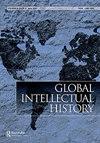Intellectual History or Philosophical History? The Indian Century as Global Miniature Violent Fraternity: Indian Political Thought in the Global Age , by Shruti Kapila, Princeton, Princeton University Press, 2021, 328pp, $37.00/£30.00 (hardcover), ISBN: 9780691195223
IF 0.4
Q2 HISTORY
引用次数: 0
Abstract
Click to increase image sizeClick to decrease image size Disclosure StatementNo potential conflict of interest was reported by the authors.Notes1 See, for instance, Maia Ramnath, Haj to Utopia; Faisal Devji, The Impossible Indian; Kama Maclean, A Revolutionary History of Interwar India.2 See, for instance, Martin Bayly, Lineages of Indian International Relations, 819–35; Vineet Thakur, Liberal, Liminal and Lost, 232–58; Vineet Thakur and Alexander E. Davis, A Communal Affair over International Affairs, 689–705; Carolien Stolte and Harald Fisher-Tiné, Imagining Asia in India, 65–92; Raphaëlle Khan, Disrupting the Empire and Forging IR, 836–55.3 Alain Badiou, The Century, 102.4 Ibid., 8–9.5 Ibid., 100–101.6 Ibid., 5–6.7 Ibid., 9–10.8 On Gandhi’s anti-statist political thinking, see, for instance, Karuna Mantena, On Gandhi’s Critique of the State, 535–63.9 See, for instance, Manu Bhagavan, The Peacemakers; Raphaëlle Khan, Sovereignty After the Empire and the Search for a New Order, 1141–74.10 Frederick Cooper, Citizenship between Empire and Nation; Gary Wilder, Freedom Time.11 Sunil Khilnani, The Idea of India; Ramachandra Guha, India after Gandhi; C.A. Bayly, Recovering Liberties.12 See Christophe Jaffrelot, Modi’s India.13 Tanika Sarkar, History as Patriotism, 171–81.14 Frederick Cooper, Postcolonial Studies and the Study of History, 401.思想史还是哲学史?《印度世纪是全球暴力博爱的缩影:全球化时代的印度政治思想》,施卢蒂·卡皮拉著,普林斯顿,普林斯顿大学出版社,2021年,328页,37.00美元/ 30.00英镑(精装版),ISBN: 9780691195223
点击放大图片点击缩小图片披露声明作者未报告潜在的利益冲突。注1例如,参见玛亚·拉姆纳特的《去乌托邦的朝圣》;费萨尔·德夫吉《不可能的印度人》;卡玛·麦克莱恩:《两次世界大战之间的印度革命史》。2参见马丁·贝利:《印度国际关系谱系》,第819-35期;维尼特·塔库尔,《自由主义、阈限与迷失》,232-58页;Vineet Thakur和Alexander E. Davis,国际事务之上的公共事务,689-705;卡罗尔·斯托尔特和哈拉尔德·费希尔-蒂诺,《想象亚洲在印度》,65-92页;Raphaëlle可汗,《瓦解帝国与锻造国际关系》,836-55.3阿兰·巴迪欧,《世纪》,102.4同上,8-9.5同上,100-101.6同上,5-6.7同上,9-10.8关于甘地的反国家主义政治思想,参见卡鲁纳·曼特纳,《论甘地对国家的批判》,535-63.9参见马努·巴伽万,《和平缔造者》;Raphaëlle可汗:《帝国后的主权与对新秩序的探索》,1141-74.10弗雷德里克·库珀:《帝国与民族之间的公民身份》;11苏尼尔·基尔纳尼《印度的理念》;Ramachandra Guha,甘地之后的印度;13塔尼卡·萨卡尔:《作为爱国主义的历史》,171-81.14弗雷德里克·库珀:《后殖民研究与历史研究》,401。
本文章由计算机程序翻译,如有差异,请以英文原文为准。
求助全文
约1分钟内获得全文
求助全文

 求助内容:
求助内容: 应助结果提醒方式:
应助结果提醒方式:


